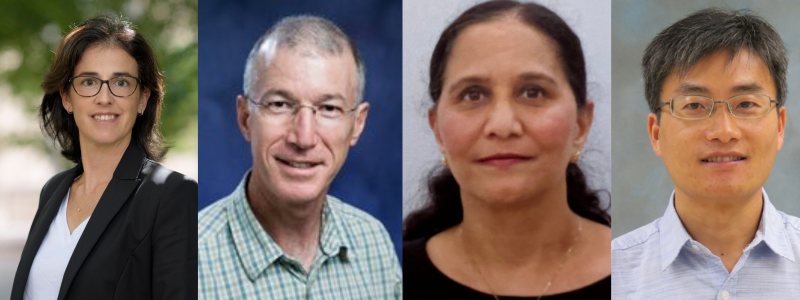Cancer Center at Illinois (CCIL) researchers Sara Pedron Haba, Edward Roy, Chitra Subramanian, and Bo Wang
The Cancer Center at Illinois (CCIL) supports the most innovative ideas from Illinois faculty through grant programs that catalyze transdisciplinary cancer research. CCIL grant funding fosters new collaborations, spanning the engineering and basic sciences continuum. The grants enable CCIL researchers to develop pilot projects that will mature and garner external funding. Each grant application is reviewed by a panel, following a process like the one used by the National Institutes of Health.
Sara Pedron Haba, Edward Roy, Chitra Subramanian, and Bo Wang are the recipients of CCIL grants exploring areas ranging from immunotherapy responses to more effective head and neck cancer diagnostics.
Planning Grant
- Project: Leverage of Biomaterial-Based Platforms in Cancer Neuroscience: Models for Multimodal Study of Radiotherapeutic Response in Brain Tumors
- Principal Investigator: Sara Pedron Haba
- Project Collaborators: Kim Selting and Catherine Best-Popescu
The CCIL awarded Sara Pedron Haba a $25,000 Planning Grant, supporting her research proposal “Leverage of Biomaterial-Based Platforms in Cancer Neuroscience: Models for Multimodal Study of Radiotherapeutic Response in Brain Tumors.” Pedron Haba is a Department of Chemical and Biomolecular Engineering faculty member. Catherine Best-Popescu and CCIL member Kim Selting will join Pedron Haba as co-investigators on the project.
“This planning grant will advance our understanding of the influence of the tumor microenvironment in glioblastoma progression and will help consolidate multidisciplinary collaborations across medicine, engineering, and neuroscience to enable further funding opportunities,” said Pedron Haba.
Seed Grants
- Project: Imaging-Based Biomarkers to Predict Glioma Immunotherapy Response
- Principal Investigator: Edward Roy
- Project Collaborators: David Kranz, Andrew Smith, Wawrzyniec Dobrucki, and Fan Lam
Edward Roy received $197,704 to support“Imaging-Based Biomarkers to Predict Glioma Immunotherapy Response.” Roy is a professor emeritus in the Department of Molecular and Integrative Physiology. CCIL members David Kranz, Andrew Smith, Wawrzyniec Dobrucki, and Fan Lam will join Roy as co-principal investigators.
- Project: Identification of Potential Diagnostic and Therapeutic Targets of Iron Metabolism in Head and Neck Cancer
- Principal Investigator: Chitra Subramanian
- Project Collaborators: Mark Cohen and Zeynep Madak Erdogan
Chitra Subramanian received $200,000 to support “Identification of Potential Diagnostic and Therapeutic Targets of Iron Metabolism in Head and Neck Cancer.” Subramanian is an associate professor at the Carle Illinois College of Medicine. CCIL program leader Zeynep Madak Erdogan will be a Co-PI, and CCIL member Dr. Mark Cohen will be a co-investigator.
“I would like to thank the CCIL for providing our group the seed grant funding to explore the role of Iron metabolism in head and neck squamous cell carcinoma (HNSCC) at the single cell level using spatial transcriptomics and single cell analysis,” said Subramanian. “Iron metabolism plays an essential role in cancer, including HNSCC. Iron can promote tumor growth or cell death. Due to dual properties of iron in cancer cells, understanding how altered iron metabolism would affect HNSCC and its tumor microenvironment will shed light on iron metabolism in cancer. Additionally, identifying the exosome biomarkers of iron metabolism will enable a noninvasive method of knowing the effect of targeting iron metabolism in HNSCC. The seed grant will provide funding for our research in understanding the essential role of iron metabolism. This research can enable translational identification of novel targets and biomarkers that alter the iron metabolism. We plan to submit a grant proposal to explore this in HNSCC patient tumors and publish our research findings.”
- Project: Targeting Membrane Phospholipid Remodeling as a Novel Therapy for Nonalcoholic Steatohepatitis-Associated Hepatocellular Carcinoma
- Principal Investigator: Bo Wang
- Project Collaborator: David Sarlah
The CCIL awarded Bo Wang $200,000 to support “Targeting Membrane Phospholipid Remodeling as a Novel Therapy for Nonalcoholic Steatohepatitis-Associated Hepatocellular Carcinoma.” Wang is an assistant professor of comparative biosciences in the College of Veterinary Medicine. Wang’s co-investigator will be CCIL member David Sarlah.
“The CCIL Seed Grant enables us to pursue a high-risk project that presents obstacles for obtaining funding from other sources due to its early-stage nature. This grant will provide us resources to conduct a screening to identify small molecules targeting a new enzyme involved in nonalcoholic steatohepatitis-mediated liver cancer, a condition on the significant rise in America. We aim to identify such small molecules and test their therapeutic potential in animal models, said Wang.”
The selected projects reflect the university’s world-class engineering, technology, and basic sciences expertise. The multidisciplinary research teams are leading the discovery of cancer diagnostic and treatment methods that have the potential to improve the quality and accessibility of care and improve the lives of individuals with cancer.
Click here to learn more about the CCIL’s grant and funding programs.

